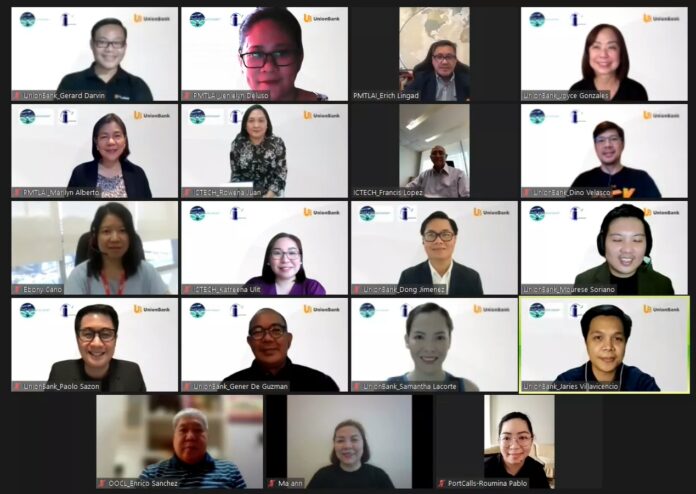
-
Philippine Multimodal Transport and Logistics Association and IC Technologies signed a MOA with UnionBank of the Philippines for eCargolink
-
eCargolink is an app that allows freight forwarders to pay shipping line and port operator charges online
-
Developed by IC Technologies, the facility will help forwarders secure faster release of cargoes from the port, and cut transport, bank and administrative costs
The Philippine Multimodal Transport and Logistics Association, Inc. (PMTLAI) and IC Technologies, Inc. on June 16 signed a memorandum of agreement with UnionBank of the Philippines for eCargolink, an app that allows freight forwarders to pay shipping line and port operator charges online.
PMTLAI announced the pilot implementation of the system involving OOCL (Phils.), Inc. and four PMTLAI members in 2019.
READ: PMTLAI to pilot test online payment facility with shipping lines
UnionBank head of transaction banking Gerard Darvin at the MOA signing said that by integrating the bank’s digital multichannel collection platform to eCargolink, freight forwarders may benefit from collection efficiency.
With the pandemic, he noted the solution offers a better alternative than having to do manual payments at shipping line offices.
Developed by IC Technologies, the facility will not only enable freight forwarders to make online payments but secure faster release of cargoes from the port.
IC Technologies president Francis Lopez, during the MOA signing, said eCargolink is the first step in its vision toward a “real cargo community system in the Philippines.”
He noted eCargolink will eliminate manual processes and face-to-face contact.
Beyond the collection of charges, Lopez said eCargolink is envisioned to enable shipping lines to submit the delivery order (DO) to freight forwarders.
PMTLAI PRO and eCargolink project chairperson Erich Lingad said they are hoping all shipping lines calling the Philippines will join the system, which will be launched in the coming weeks.
The current process for cargo release is circuitous: the shipping line issues an invoice and bill of lading to the freight forwarder, who in turn withdraws from the bank or makes an e-transfer of funds then pays the shipping line either in cash or through the latter’s designated banks.
After receiving payment, the shipping line will issue a receipt, and the freight forwarder’s processors will then have to go to the shipping line’s office to queue, sometimes taking a whole day to do so.
IC Technologies sales and marketing manager Katreena Michelle Ulit, during a presentation introducing the system to PMTLAI’s general membership in 2019, said eCargolink is mobile-ready and allows freight forwarders to process the release of shipments in the comfort of their office.
The freight forwarder can get the invoice and B/L from the shipping line through eCargolink, then encode and make the payment to the affiliated bank without leaving the office.
The bank will then send payment confirmation to eCargolink and the shipping line; the carrier will acknowledge payment with a confirmation sent through the online facility and issue the DO to the terminal operator.
Ulit explained that online processing will cut transportation, bank and administrative costs; and prevent delays in cargo release and subsequent costs due to demurrage and storage. It may also eliminate questions on authenticity of the DO and identification of the officer authorized to withdraw the container from the terminal.
Moving forward, IC Technologies will work toward including other banks and payment facilities and shipping lines in eCargolink and effect integration with more terminal operators.
The group is eyeing electronic endorsement of documents accepted by shipping lines and by government agencies such as the Bureau of Customs and Philippine Economic Zone Authority. – Roumina Pablo




